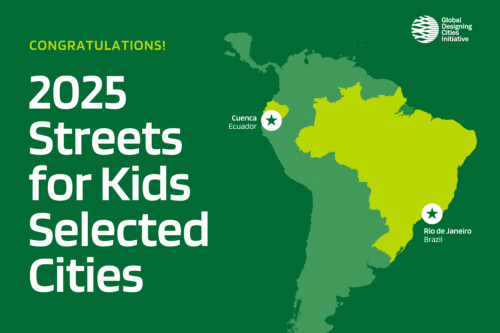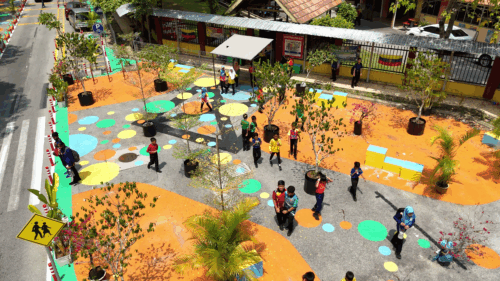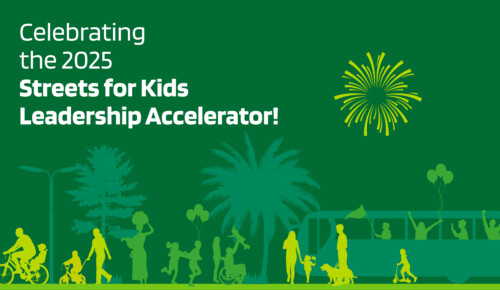GDCI Street Shaper of the Month
Rebecca Campbell
Managing Director, Open Streets Cape Town
Cape Town, South Africa

Rebecca leads Open Streets Cape Town’s strategy and program delivery
Please tell us about your work on urban streets and/or mobility.
Open Streets Cape Town (OSCT) brings people together to experience streets as places of connection and belonging, to break down social barriers, and to build a sense of community in neighbourhoods across Cape Town, helping to create a connected, safe, and inclusive city. Through Open Streets Days, collaboration with community partners, and advocacy work, we actively demonstrate the potential of vibrant, people-friendly streets and public spaces in order to change behavior and shift the culture of how we live together in our cities.
What are the biggest mobility and/or road safety challenges in your city?
Cape Town has a perfect storm of mobility challenges: an apartheid planning legacy of spatial segregation, car-centric design, long distances between where people live and economic opportunities, a failing rail system, rising traffic congestion, poor facilities for walking and cycling, and an extremely high incidence of road fatalities. Of all these, the absence of functioning—let alone safe and reliable—trains is probably the biggest challenge. That, and the lack of respect we have for each other.
What is it like to be a pedestrian in your city?
To be a pedestrian in Cape Town is to be very vulnerable. The street environment is often tricky to navigate with many obstructions, limited space, poor pedestrian traffic signal phasing, aggressive driver behavior, and risk of falling prey to petty theft. This means that we have a culture of ignoring rules (e.g. crossing safely) out of necessity. But walking is how many people get around because there’s no other option. And despite the risks and challenges, it’s also the best way to connect with other people and be more in touch with the reality of our city.
Tell us about your daily commute and what you most like or dislike about it
We recently moved offices, so I have been exploring a new commute. I either ride my bicycle or use e-hailing taxi services depending on how I’m feeling and what my day looks like. (Previously I was lucky to have the option of walking because I had a very short commute.) I love cycling because it gives me energy, chats, and smiles with strangers, and a chance to explore. But it can also be stressful if I have close calls with people driving vehicles badly.
Tell us about an innovative urban project(s) or approach(es) that has inspired your work.
We were inspired by Bogotá’s Ciclovía program, which creates a network of over 100 km of “open streets” on a weekly basis, used by an average of 1.5 million people. It’s amazing how, despite all of the city’s mobility challenges, there has been this regular rhythm of people exercising (literally) their ownership of streets and public space together for half a century.
What is the biggest challenge or most common roadblock you face in implementing innovative projects in your city?
There is a culture of risk aversion and regulation of innovation to avoid negative consequences. In our case, this manifests in red tape around getting the necessary permits for Open Streets Days. Both government officials and private initiatives are hugely constrained as we all try and navigate this tight environment.
What mobility, public space, or road safety improvements would you like to see in your city by 2030?
We would love to see major investment in cycling infrastructure, so that it becomes a real option for more people to get around by bicycle. Besides all the benefits (health, money saving, time saving, reducing congestion etc.), we believe that more bicycles will make our roads safer for everyone.
What is your favorite urban/mobility/public space/cities-related quote?
“If streets are the yardstick of success in our cities, then children should do the measuring” – Marcela Guerrero Casas, OSCT Founding Director
Any recommended reading, listening, or watching
The quote above is from a chapter in a new book by STIPO called “The City at Eye Level for Kids.” I’ve also been enjoying a local podcast called “Talking Transformation”, which is a series of open conversations addressing contemporary city building and spatial transformation issues in South Africa. Its host has over 20 years of public service and covers a broad range of topics. It is interesting for those living here, but also for anyone wanting more granular insight into South African urban development





